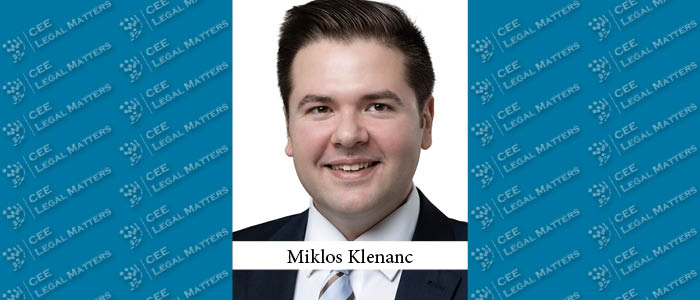"Basically Slovakia is doing quite well in terms of macro-economic data,” says Adrian Barger, Partner at Slovakia’s Barger Prekop law firm.
“The economy is among the fastest-growing in the EU and Eurozone, with GDP growth steady at about three percent. And it is expected to grow even faster in 2018 and 19, exceeding four percent.” Barger says that “the main driving force behind the growth is exports — Slovakia is a heavily export-oriented economy — driven by automative engineering, and in the past few years by private consumption, meaning Slovakian private individuals are spending more money, because salaries have been growing, and the general environment is very optimistic, so people are willing to spend more money both on consumer goods and on investments.” Barger says that mortgage market is "particularly strong, with really low interests and a high ratio of financing. People are willing to invest in real estate, not just for their own circumstances, but also for investment.”
Barger says he and his colleagues are keeping an eye on the growing real estate bubble. "Prices," he says "especially in Bratislava, but also in other cities like Nitra (where the Jaguar/Land Rover construction facility is being constructed), are growing. People are moving to those cities to work, and real estate prices are going up as a result. There are signs that the bubble will burst, though nobody knows exactly when that will happen. Growth is really high — in some regions and categories about 10% per annum — and we are seeing the same signs we saw in the previous crisis in 2007 and 8, when people were buying apartments without even seeing them, and buying real estate purely as investments.” According to the Barger, “the National Bank is already cautious about it and is taking some precautionary measures, such as putting pressure on the commercial banks to decrease the amount of mortgage financing. Until recently it was common for banks to pay 100% of the purchase price. Now that percentage is decreasing, so that fewer people will be able to afford financing.” He pauses. "Whether this will suffice is still a question.”
Barger, whose firm has a strong real estate practice, says that he and his colleagues are busy at the moment with development and investment projects, "especially in the retail and industrial sectors.” He sees a significant amount of interest in construction of industrial parks around Bratislava and the principal industrial hubs where the car manufacturers are located, but he says "there’s not enough land. There’s enough money, and interest, but available land for development is scarce.”
"There’s also a lot of Corporate/M&A in the market,” Barger reports. "I would break this down into two main areas: The first is traditional Corporate/M&A, involving foreign investors coming in to buy businesses or set up their own branches. The other area where we see a lot of activity is the result of the change of generations, where the founding fathers of small and medium enterprises are slowly exiting and are trying to find successors to take over their businesses.” Barger says, “that’s not a new phenomenon, but there’s a lot of activity on the mid-market segment of between EUR 5 and 20 million as a result.”
Moving to the topic of significant legislation, Barger describes "a lot of pressure on transparency and AML legislation.” According to him, “in February of this year a new Act on Public Sector Partners came into effect, which forces businesses dealing with the public sector to disclose ownership structure up to the level of ultimate beneficial owners. What it does is basically force the businesses to hire external parties — either an attorney or a tax advisor or an auditor or a bank — to verify their ownership structures.” This, of course, entails significant responsibility for those experts. “These advisors are liable for the completeness and accuracy of the date disclosed,” Barger says, "so there’s a lot of pressure to do it correctly, and the data disclosed in the publicly-available and online register is more complete than in the past.” According to him, “the law has been accepted by the business community, generally, and it’s producing some fruit already in terms of bringing some transparency and the ability to work with the data and disclose the connections between various stakeholders.”
Barger says that this new requirement “represents a new revenue stream for law firms,” especially because “there’s an obligation ot update the data on at least an annual basis, which requires the companies to undergo the same exercise every year.” He says, “not everybody is doing the work, because it involves increased liability, and the law firms do not have all the data that is being supplied under control, but many law firms have found new revenue in the process. Especially because banks have not been active in the verification process at all. So most of it has been done by attorneys or tax accountants or auditors.”
"Also connected to the push for transparency and recent AML legislation is the amendment to the Commercial Code that was adopted by the Parliament in October 2017,” Barger says. "The amendment is designed to fight tax evasion and tax fraud and creditor fraud by making it more difficult for companies to disappear leaving large debt behind either to debtors or the state. It imposes an obligation on merging companies to run an audit and to determine the value of assets and liabilities even where the companies, before the merger, where not obliged to retain an auditor.” He says, “so this is making mergers and spin-offs more difficult than in the past. Also persons who have debts with social insurance companies or the tax office will not be able to set up new companies.” The amended law, which is currently awaiting the President’s signature, is scheduled to come into force on January 1, 2018.
Looking back on these two new pieces of legislation, Barger says, shows that both represent “the effort to increase transparency.” He says, “there is a lot of focus on compliance, and we see rules on corporate governance and position of compliance officers in companies getting more and more important.” The significance for the legal industry is difficult to miss. According to Barger, "this side of business will generate a lot of potential for legal business in this area.”
"The last bit,” Barger says, “are the new Procedural Codes that came into force in July 2016, but really, 2017 was the first year when we saw full application of these codes in the Slovak courts. These are completely new Civil Procedure rules and Administrative Procedural rules that are aimed to make the process more efficient by introducing certain new institutions which were previously not available, including various interim injunctions.” In addition, he says, "evidence collection and gathering of proof and evaluation of evidence has changed significantly.” He is encouraged by the changes. "I think in general this was a step forward. The previous codes originated in the 1960s, and although they were amended many times in the 90s and 2000s, those codes were not able to cope with the new situations, and the number of cases in the courts, so the time was right to adopt replacements. We are already seeing that the procedure in courts is more effective and less rigid, and these new codes allow us to communicate better with the courts during proceedings.”
Finally, Barger speaks positively of the Slovakian state's commitment to moving towards an "e-government.” He explains that "since July of this year, all businesses must communicate with the state and the public sector electronically, and the public sector is communicating with businesses only in electronic form. This represents an enormous effort by the state. It is quite new, but from my personal experience I approve of it. It saves us and clients substantial time, although there are many practical problems with the system.” He reports the recent discovery that by researchers at the University of Brno that the electronic certificates in state identification cards are badly encrypted, leading the Slovakian Ministry of the Interior to cancel the certificates in all (the hundreds of thousands) issued ID cards as a precaution, meaning that card holders are no longer able to sign the documents electronically. "There is big uncertainty about what’s going to happen in the coming weeks,” he says, as the Ministry has to engage a new supplier to prepare new encryption, which should take 5-7 weeks, leaving communication channels severely limited in the interim. Still, he expresses confidence that this will, ultimately, be a small blip in an otherwise successful roll-out. “Eventually the e-government will move forward, and this is a good step.”



























